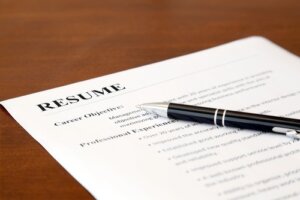Career Advice for Job Seekers
The Essentials Of Writing Your First Resume
Writing your first resume may seem like a difficult task. A resume is critical in the job seeking process. It communicates to hiring managers and recruiters how qualified a person is for a particular job. Writing a good one can improve your chances of getting a position in your chosen pursuit. When writing a resume, it is important to remember a few essential points.
Include the Basics
Your name marked in bold, with a slightly larger font, should be the first thing on your resume. Your contact information should be listed next, keeping in mind that your email should be professional. Emails that include nicknames are not impressive to recruiters.
List Achievements
Instead of including all the responsibilities of the last jobs you had, list your accomplishments, especially the ones relating to the position you are inquiring about. By providing value through your specific achievements, you will avoid writing a boring and redundant list. It will display to the recruiters what potential you have to make a difference in their organization.
Optimize
When writing your first resume, optimizing is important, especially in technical fields. Having SEO, search engine optimization, skills may be helpful since keywords are crucial to recruiters. Resumes sent in electronic format, are sometimes reviewed using a digital database. Candidates are quickly narrowed down when recruiters enter in specific qualifying search terms. If you don’t have the right keyword for situations like these, you may miss out even if you are qualified for the job.
Use Bullet Points
Hiring managers may not have the time to read through long paragraphs in piles of resumes. List your information in bullet points instead of complete sentences to make the review of your resume faster and easier.
Put Important Information First
When describing your work experience, skills, or educational background, list the most important items at the top of each section. Chances are that a hiring manager will pay the most attention to the first qualities listed under each category.
Customize
Tailor the content of your resume to the job you are applying for. Generic resumes are not as impressive to recruiters and may even contain irrelevant information concerning the position you are seeking. Any unnecessary details won’t help you, but may actually hurt your chances of getting an interview.
Be Honest
Lying will only bring on trouble that will eventually catch up to you. Many human relations departments do background checks, in which your credibility could become marred. If an organization does hire you and discovers you have lied on your resume, you could be fired.
Spelling and Grammar
After working so hard to write a good resume, the last thing you want to do is foil your opportunity with misspelled words and incorrect grammar. Spell-check your document then have someone proof it for grammatical errors.
Use a Conventional Format
Making your resume stand out unusually by using a format that is different than everyone else’s, may actually make you appear unprofessional. Even if you are applying for a creative profession, a resume may not be the place to express this skill.
Include a Cover Letter
A cover letter is an introductory document that should accompany the resume. It sales you and explains your qualifications for a desired position. Often, it is considered a first screening and should catch the immediate attention of the employer.
Remember, a resume is to help you obtain an interview, which will hopefully lead you to the job you want. Take the time to write a good resume, and it will eventually pay off.
Jason Kay is a professional resume writer and frequent contributor to the JobGoRound blog.
New Job Postings
Advanced Search